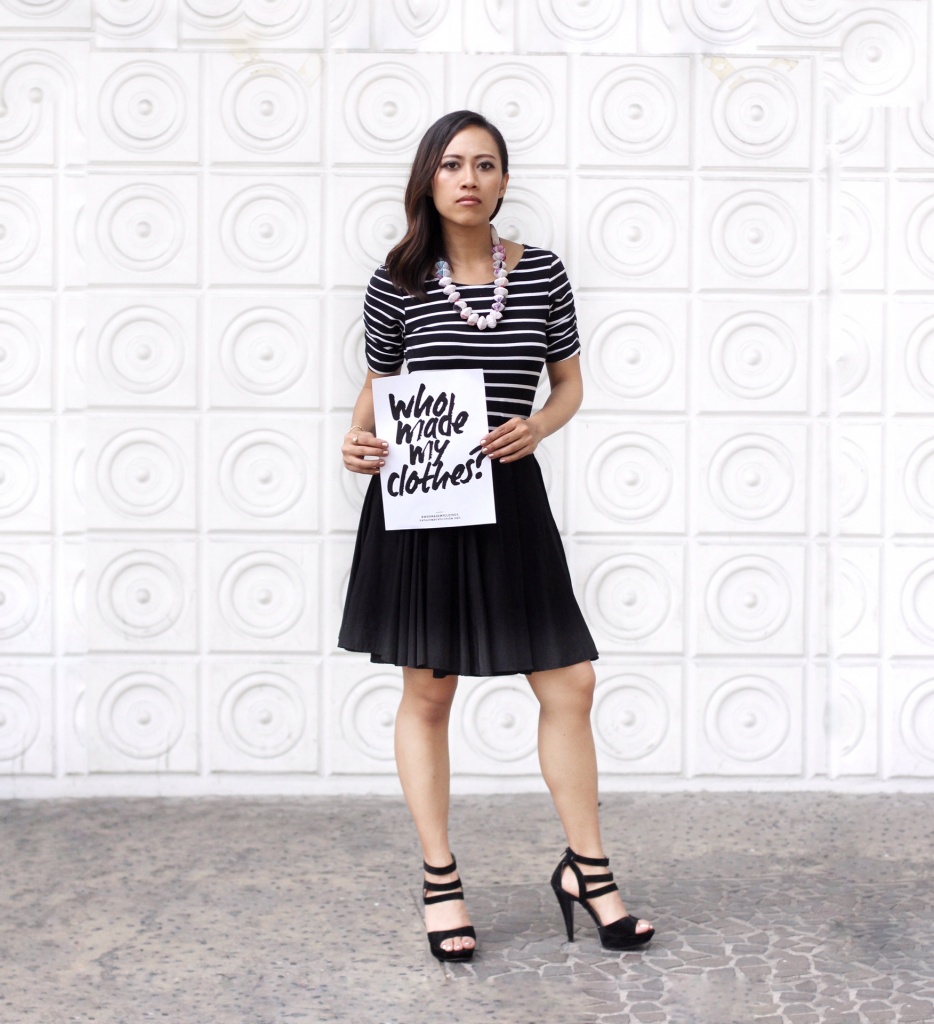 By Stephanie Fong
By Stephanie Fong
For most of us, having an abundance of what we need seems like a good thing.
This can be especially true of clothes. How easy it is to pick up a few bagfuls of inexpensive clothes for the current season, just to forget them entirely when the weather changes?
But what happens when an overabundance of “stuff”—so easily purchased and then discarded—comes at a price for someone else?
That’s what Jame (aka Jella) Jornales of the Philippines asks herself and her social media friends as part of what she calls her “passion project” promoting ethical fashion and minimalist living.
Jella developed a love of fashion and the arts when living in London, England. She also spent time living and working in various locations in the United States, including Medora, North Dakota. (You may recognize her face from ads for Medora’s Rough Riders Hotel a few years back.)
A self-confessed former shopaholic, Jella says her world-view changed in 2015. She began living a more conscious lifestyle after watching “The True Cost” documentary, a film that explores the social and environmental impact of the fast fashion industry.
Seeing the film opened Jella’s eyes to what ethical fashion was and inspired her to start putting people over profit. She began shopping from ethical companies who treat their workers and the environment with respect.
She also became conscious of her role as a consumer in the age of fast fashion.
“It seems like we are brainwashed to always need to get the latest—whatever is trendy. It almost seems like we are owned by our things when it should be the other way around.”
Jella decided to pare down her own clothing collection to have a “capsule closet”—a small number of high-quality, stylish, and versatile pieces she loved that could be paired with multiple outfits. (Think of the “Tiny House” movement, but in terms of clothes: less is more.)
Clearing out and donating a lot of the clothes she owned was eye-opening and even heart-breaking, as she realized how much money and time had been spent on items she seldom wore.
“I used to own 300-plus pieces of clothing two years ago and am now down to around 70. Simplifying my closet and choosing to only buy ethically and sustainably has been one of the best decisions I’ve ever made,” says Jella. “I started realizing that I don’t need much to be happy and that made all the difference. Now I can actually say I own my things instead of the things owning me.”
Inspired by how this lifestyle change benefited her own life, Jella uses social media as a platform to encourage her online community, to share brands she believes in, and to simply try to make a difference.
In Jella’s day job she works as a full-time financial advisor. However, thanks to her Instagram account
@jellajornales, she’s known to many as the “Ethical Fashion Blogger.”
She is also involved in international organizations such as Fashion Revolution, which challenges consumers to direct the hashtag #WhoMadeMyClothes at their favorite clothing brands on social media.
“We want more brands and companies to take responsibility in each part of the supply chain, all the way to the garment workers themselves. We are calling for transparency and accountability.”
For those wondering how to shift their shopping habits, Jella has these tips:
Start small. The easiest thing anyone can do is to CONSUME LESS. Whenever you feel the need to buy something, just ask yourself this question: “Do I really need it or am I just buying this because I want it?”
Be aware. Ask yourself, “Who made my clothes?” Look for brands that are ethical and have a sustainable business model.
Shop simple & swap. Thrift-store shopping and participating in clothing swaps are great ways to refresh your wardrobe with clothing pieces that still have life and style in them.
Back home in the Philippines, Jella has started speaking on panels and at seminars about the topics she is passionate about.
“Educating people is important because most of us go on with our day not knowing that there are consequences to our [clothing] choices. I try to start a conversation in a way that sparks curiosity and inspires others to also look at how they consume. I do it in a positive and engaging way because the last thing I want is to guilt-trip people.”
She says her passion is fueled by her faith. “I am inspired by Jesus’ teachings. One of my favorite verses is Micah 6:8 because it talks about acting justly, loving mercy, and walking humbly with our God.”
[supsystic-gallery id=60]
Stephanie Fong
Stephanie Fong lives in Dickinson with her husband, Carter, daughter Sydney, and son Parker. Originally from Powers lake, North Dakota, she has lived in southwestern North Dakota for over a decade. She enjoys contributing stories about interesting and inspiring women.
